« June 2008 | HOME PAGE | August 2008 »
July 30, 2008
Rebiya's Right Shoulder
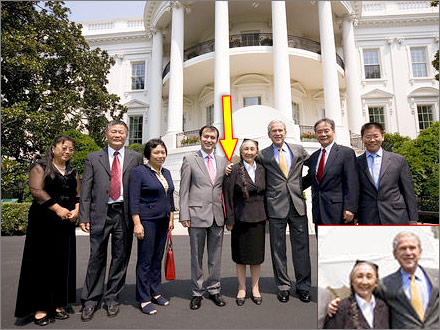
Exiled Uyghur leader Rebiya Kadeer gets a bit of the Angela Merkel treatment during a meeting between President George W. Bush and a group of Chinese dissidents on July 29, 2008. You may remember that Bush and Kadeer posed for a friendly photo during a meeting in Prague last summer.
posted July 30, 2008 at 11:31 AM unofficial Xinjiang time | Comments (98)
July 28, 2008
The Phantom Menace?
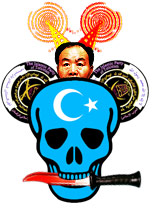 A topic that deserves its own thread: is the threat of terrorism in China real or imagined? Does the Turkestan Islamic Party (TIP) pose a real threat to the country? Does the group even exist?
A topic that deserves its own thread: is the threat of terrorism in China real or imagined? Does the Turkestan Islamic Party (TIP) pose a real threat to the country? Does the group even exist?
A few South China Morning Post articles stoked the fires of doubt yesterday, and I'll share them with you here to get your creative juices flowing. (Please, only share your juices related to the latest "threat".)
First, a few of the other Uyghur terrorist groups that supposedly claimed attacks during the 1990s only to disappear as soon as they'd come to life:
On February 5, 1991, the "Islamic Reformist Party" carried out a bus bombing in Urumqi , killing and injuring more than 20 people. Between June and September 1993, the "East Turkestan Democratic Islamic Party" carried out a series of bombings in southern Xinjiang, which led to at least two deaths and 36 injuries. On February 25, 1997, the "East Turkestan National Solidarity Union" staged a series of bomb attacks in Urumqi, which killed nine people and injured more than 60.
SCMP also interview prominent Uyghur dissident Dilxat Raxit, who said he "had never heard of the group until yesterday" and also doubted the ability of Uyghurs to carry out the claimed attacks:
"The Uygurs have been hunted and pushed back on every front. It is impossible for them to plan and carry out terrorist attacks in the remote city of Kunming ."
He even suggested that the video by the group, claiming responsibility for explosions that killed five people on buses in Shanghai and Kunming, could have been staged by Beijing to discredit the East Turkestan Islamic Movement (ETIM) and brand it a terrorist organization.
"The timing is really suspicious," Mr Rexiti said. "The US Congress will pass a motion next week condemning China's crackdown on Uygurs And the Congress will ask US President George W. Bush to raise the issue with Chinese leaders.
"The release of this videotape hands the initiative back to the Chinese government. Claims of terrorist attacks [by Uygurs] is what they wanted most. We suspect the video could well have been ordered by Wang Lequan [the top official in Xinjiang ]. He has long been using anti-terrorist campaigns to consolidate his own power."
He said "anti-terrorism" had become a catchword for party officials in Xinjiang seeking to win resources and promotion from a nervous central government as the Olympic Games approached.
So, talk amongst yourselves. I just wanted to split this off from the pole dancers below. Please stick to the topic at hand.
Independence bid in Xinjiang unlikely to succeed: expert
South China Morning Post
July 27, 2008 Sunday
by He Huifeng
The East Turkestan Independence Movement is a diverse and loose grouping of Uygur activists, and their objective of establishing an independent Xinjiang has little chance of success because of the lack of leadership and organisation, mainland scholars say.
Yang Shu, a Central Asia expert at Lanzhou University, said that despite there being more than 50 East Turkestan organisations of various sizes overseas, they had failed to establish a united leadership.
He described "East Turkestan" as only a general concept, not a well-organised system. "They are all only mobs, separated by different interests and splinter groups," Professor Yang was quoted by the Sanlian Life Weekly earlier as saying.
He said small East Turkestan organisations usually launched small-scale violence in Xinjiang, while larger groups carried out activities in Europe highlighting demands for independence in the region.
Wang Mingye, a Xinjiang expert, said the East Turkestan Independence Movement was at an initial development stage without a mature political programme, and lagged far behind sophisticated terrorist groups in the Middle East.
The independence movement comprised more than 50 organisations - some of which had been active terrorists - since the 1990s. They operated mostly in Xinjiang but also throughout China and neighbouring countries. The movement was often confused with a much smaller, more radical and tightly structured organisation - the East Turkestan Islamic Movement, he said.
The East Turkestan Islamic Movement, together with the East Turkestan Liberation Organisation and the World Uyghur Youth Congress and some other groups had been labelled by China and the United States as terrorist organisations.
Mainland authorities have previously accused Osama Bin Laden's al-Qaeda network of funding these groups to train terrorists and carry out terrorist activities in Xinjiang.
On February 5, 1991, the "Islamic Reformist Party" carried out a bus bombing in Urumqi , killing and injuring more than 20 people.
Between June and September 1993, the "East Turkestan Democratic Islamic Party" carried out a series of bombings in southern Xinjiang, which led to at least two deaths and 36 injuries. On February 25, 1997, the "East Turkestan National Solidarity Union" staged a series of bomb attacks in Urumqi, which killed nine people and injured more than 60.
Mainland authorities have launched extensive anti-terrorism campaigns in recent years, particularly this summer in the run-up to the Olympics.
Earlier this month, mainland authorities said 82 suspected Islamic terrorists and separatists had been detained in the first half of the year after police raids on terrorist training camps and sites.
Uygur activists question new outfit's abilities
South China Morning Post
July 27, 2008 Sunday
by Choi Chi-yuk
Mainstream Uygur independence activists last night distanced themselves from the previously unknown Turkestan Islamic Party after it claimed credit for several bus bomb blasts on the mainland.
Dilxadi Rexiti, a spokesman for the Germany-based East Turkestan Information Centre, said the centre had never heard of the group until yesterday. Mr Rexiti also questioned whether the Turkestan Islamic Party was capable of launching the kind of terrorist attacks it claimed.
He said that while mainstream Uygur independence groups did plan to protest during the Beijing Olympics, they would not resort to violence or target ordinary people.
"We absolutely won't do anything like that," Mr Rexiti said. "We are not against ordinary Han people, we are just fighting against the regime."
He said Beijing had launched brutal crackdowns on Uygurs in the run-up to the Olympic Games and he doubted the group - given its limited resources and experience {minus} could carry out well-planned attacks in different mainland cities.
"The Uygurs have been hunted and pushed back on every front. It is impossible for them to plan and carry out terrorist attacks in the remote city of Kunming ."
He even suggested that the video by the group, claiming responsibility for explosions that killed five people on buses in Shanghai and Kunming, could have been staged by Beijing to discredit the East Turkestan Islamic Movement (ETIM) and brand it a terrorist organisation.
"The timing is really suspicious," Mr Rexiti said. "The US Congress will pass a motion next week condemning China's crackdown on Uygurs And the Congress will ask US President George W. Bush to raise the issue with Chinese leaders.
"The release of this videotape hands the initiative back to the Chinese government. Claims of terrorist attacks [by Uygurs] is what they wanted most. We suspect the video could well have been ordered by Wang Lequan [the top official in Xinjiang ]. He has long been using anti-terrorist campaigns to consolidate his own power."
He said "anti-terrorism" had become a catchword for party officials in Xinjiang seeking to win resources and promotion from a nervous central government as the Olympic Games approached.
In an earlier interview with the South China Morning Post, Mr Rexiti admitted "some Uygurs might have resorted to violence" after police crackdowns. But the majority of groups under the umbrella of the East Turkestan Independence Movement remained peaceful.
The East Turkestan Independence Movement comprises advocates of an independent Xinjiang. Some of its member organisations have been labelled terrorist by China, the United Nations and the US.
But Mr Rexiti said his centre and other mainstream Uygur groups remained committed to peaceful protest.
posted July 28, 2008 at 07:46 PM unofficial Xinjiang time | Comments (70)
July 26, 2008
Hot Chinese Pole Dancing Video!
Sure, I may be trawling for traffic, but could you say any less about the New York Times, who published this article/video yesterday? Of course, you can read the article over at their site (or below)... but isn't pole dancing an issue more conducive to visual examination? I think so too.
By the way, the part in the middle where they're trying to teach a young girl how to pole dance on a Chinese talk show is sick! I don't think it's possible to remove the "shadier elements" from pole dancing... that's called "dancing", sans the pole, hot pants, and boob grabbing.
ALSO Check out the New Dominion's coverage of the Turkestan Islamic Party's claim of responsibility for four recent attacks in China, including bus bombings last week in Kunming and in Shanghai in May.
UPDATE You can watch the Turkestan Islamic Party's video statement of responsibility/music video here.
From the Erotic Domain, an Aerobic Trend in China
The New York Times
July 25, 2008
By JIMMY WANG
BEIJING — Clad in knee-high leather boots, spandex shorts and a sports bra, Xiao Yan struck a pose two feet off the ground, her head glistening with sweat and her arms straining as she suspended herself from a vertical pole.
“Keeping your grip is the hardest part,” she said. “It’s really easy to slide downward.”
Ms. Xiao, 26, who works as a supermarket manager, is one of a growing number of women experimenting with China’s newest, and most controversial, fitness activity: pole dancing.
“I used to take a normal aerobics class, but it was boring and monotonous,” Ms. Xiao said. “So I tried out pole dancing. It’s a really social activity. I’ve met a lot of girls here who I’m now close friends with. And I like that it makes me feel sexy.”
A nightclub activity mostly considered the domain of strippers in the United States, pole dancing — but with clothes kept on — is nudging its way into the mainstream Chinese exercise market, with increasing numbers of gyms and dance schools offering classes.
The woman who claims to have brought pole dancing to China, Luo Lan, 39, is from Yichun, a small town in Jiangxi Province in southeastern China. Her parents teach physics at the university level.
“I’m not good at science like my parents. I’m the black sheep of my family, in that sense,” she said.
Ms. Luo said she struggled in 20 different occupations — secretary, saleswoman, restaurateur and translator among them — before deciding to take a break. She traveled to Paris in 2006 for vacation. It was there that she first saw pole dancing.
“I wandered into a pub, and there was a woman dancing on the stage,” she said. “I thought it was beautiful.”
Ms. Luo, who quickly discovered that pole dancing for fitness was popular in America, realized that if she could take away the shadier aspects of the erotic dance and repackage it into an activity more acceptable to mainstream Chinese women, she might create a Chinese fitness revolution. Here was an exercise that would allow women to stay fit and express their sexuality with an unprecedented degree of openness and freedom.
But she remained keenly aware of the challenges in a society where traditional values dictate that women be loyal, faithful and modestly dressed.
Upon her return to Beijing, Ms. Luo invested a little under $3,000 of her savings to start the Lolan Pole Dancing School. She placed advertisements in a lifestyle newspaper and called friends to get the word out.
Slowly, young women trickled in to take a look.
“People here have never seen a pole dance, and for that reason they don’t associate it with stripping or women of ill repute,” Ms. Luo said. “I knew if I could give people a positive first impression of this as a clean, fun, social activity, people wouldn’t just accept it, they’d embrace it.”
Before long, Ms. Luo was contacted by several magazines. In March 2008, Hunan Television, a nationally broadcast network, invited her and a group of her students to perform on a talk show.
“Most of the people in the audience had no idea what this was,” said Hu Jing, 24, an instructor at the Lolan School. “They just thought it was fun and clapped afterward.”
Since the broadcast, pole dancing for fitness has spread through China. The school now has five studios with plans to open six more this year. A rival pole dancing school, Hua Ling, opened half a year after the Lolan School.
Pole dancing’s move onto the fitness scene, however, has been a rocky one. Many Chinese, who disapprove of its sexual movements, consider it unruly and licentious.
“Five years ago, this wouldn’t have been permitted,” said Zhang Jian, 30, a manager in an interior design firm. “I think this is just a fad, and I don’t think it’s appropriate for women.”
Ms. Luo said she had received prank calls and plenty of criticism. “I’ve been contacted by many people who don’t like what we’re doing,” she said.
But those who embrace pole dancing for fitness are a snapshot of urban youths whose values are changing from those of their parents.
Although China has no state religion, study of Confucianism and Taoism, two conflicting philosophies that underlie much of modern Chinese thought, is mandatory in China’s education system. While Confucianism emphasizes achievement and propriety, Taoism stresses the unseen strengths in being humble and, in some cases, being perceived as average.
Although Jiang Li, 23, a pole dancing student, studied both philosophies in school, she said she could subscribe to neither.
“A lot of people expect Chinese women to be subdued and faithful, that we should marry and take care of kids at an early age,” she said. “But I don’t think that way — I want to be independent. I’ve been studying traditional Chinese dance for many years, but this is totally different. I feel in control when I do this. If I learn this well, I feel I can be a superstar. I want to be a superstar.”
Lucy Liang contributed research.
posted July 26, 2008 at 12:14 PM unofficial Xinjiang time | Comments (40)
July 21, 2008
The Tibetan, the Uyghur & ... the Hui?
I was reading an entry on racial profiling during the Olympics over at Shanghaiist, and was surprised at the list of three suspicious minority groups devised by Tomorrow Square's security department:

Which means,
Whenever anyone that can be identified as "Tibetans", "Xinjiang Uyghurs" and "Qinghai Hualong Hui's" enters the building, please report them to the security department. Security guards will persuade them to leave the building, or follow them till they do so.
Now, everybody knows that Tibetans and Uyghurs are up to no good, but how in the world did Hui Muslims get on the shit list? Perhaps under the influence of what Uyghurs told me more than once back in my Xinjiang days, I've long held the idea that Huis occupy the profitable territory between exotic minority group and a Han's best friend. That is, they stick together and exert their influence as a group when it's in their interest, but otherwise try not to rock the boat. Reminds me of another supposedly business-savvy minority group...
But the list above doesn't single out all Huis, just Qinghai Hualong Huis. Perhaps you'll remember last month's entry about tension between Hui and Tibetan residents in Hualong County... which is where I spent last January volunteering in a small village. I wasn't living in the county seat, which was about 2 hours away by four-wheel drive taxi, but something stuck with me from the two times I passed through: guns, guns, guns! (Mouse over the images for a translation.)
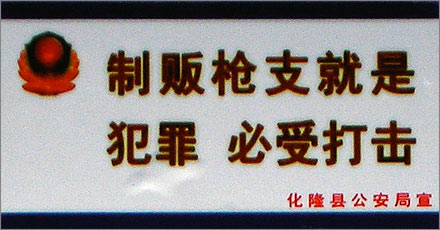
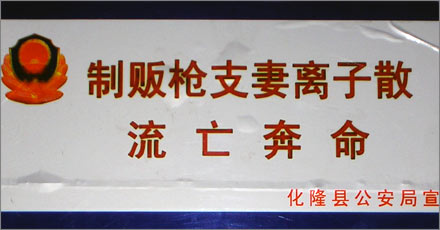

I photographed the signs above while spending the night in a cheap hotel in Hualong during my escape from the Tibetan icebox. It turns out that Hualong County is the center of China's "Gun Sales Axis", where every mom and pop farmhouse conceals an underground arms factory:
In the 1990s, uncovered cases revealed that illegal gun sales cases in provinces like Shanxi, Hubei, Hunan, Sichuan, Anhui, Xinjiang, Tibet, etc. are nearly all related to Hualong County.
Hualong County's gun-making criminals' activities appear to have picked up momentum. Some criminals who have been hiding continue their illegal gun sales. Some escaped to other regions in the province to start a new hideout workshop... Manufacturing cells are usually located in a hidden place in the front or backyard for easy access. Some may even dig tunnels to connect to other places as an escape route. These underground armament factories are extremely crude. Workers are mostly illiterate but the guns that they produce can be very refined. Additionally, their gun techniques are continuously enhanced.
In Hualong, whether it is the gun-making group or the gun sales group, these groups are mostly composed of blood relatives like fathers, sons, uncles, nephews and brothers.
The place is so bad that last year, when China was comparing itself favorably to the US after the Virginia Tech shooting rampage, a Public Security Ministry spokesperson made a point of saying that the problem of illegal guns in Hualong County was still "severe".
I'm not sure how this all adds up to Hualong Huis making the terror list, as Huis have traditionally been more or less loyal to the powers that be (another similarity with that other group). Maybe I'm following the wrong line of inquiry... any other ideas?
Here's a photo of the main strip in Hualong's county seat:
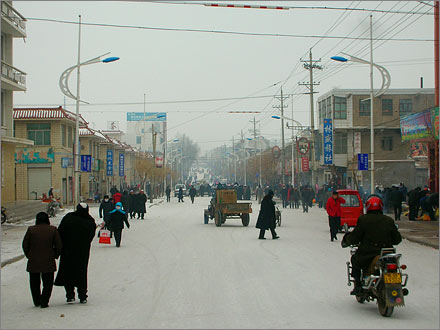
And while we're talking about signs in Hualong, I might as well include this population control banner:
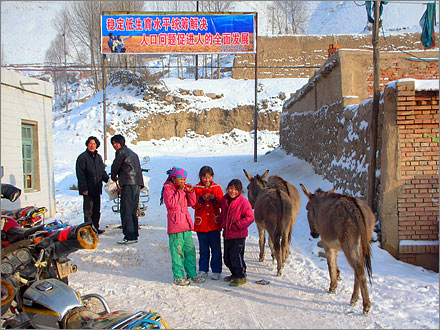
••••
As for me, I'm proud to report that I received my Z visa on the second try and returned to Beijing last Friday. Now I've got about a week to hunt for a new apartment, and 30 days to sort out my residence permit and foreign expert's certificate during the height of Olympic super-craziness. Oy! Good luck, me.
posted July 21, 2008 at 08:06 PM unofficial Xinjiang time | Comments (134)
July 14, 2008
Maid of the Mist

Greetings from Niagara Falls!
posted July 14, 2008 at 11:03 AM unofficial Xinjiang time | Comments (71)
July 12, 2008
Great Xinjiang Eclipse: T-minus 20 days
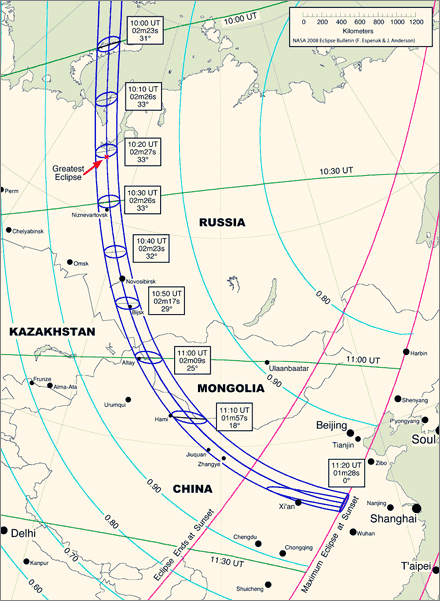
An announcement for those of you living in arctic Canada, northern Greenland, the North Pole, or Siberia ... the Great Xinjiang Eclipse (that's what I'm calling it) of August 1, 2008 is only 20 days away! This notice also applies to people living along the Hexi Corridor in Gansu, and residents of Xi'an with access to a helicopter or a hot-air balloon. You'll be looking for the eclipse at sunset.
A total solar eclipse will occur along a path stretching through mostly uninhabited northern stretches of the Earth, with a long pass over Xinjiang's eastern border with Mongolia (the country) and Inner Mongolia (the autonomous region).
Many eclipse buffs, and a number of tour groups, are heading to the tiny town of Yiwu northeast of Hami in eastern Xinjiang. It's more or less the best site in terms of expected viewing conditions along the narrow path of the total eclipse. The phenomenon will occur in Xinjiang about 5 to 10 minutes after 7pm Beijing time (5pm unofficial local time) and should last almost two full minutes. A team from the University of Manitoba did a site survey of Yiwu in 2006 with lots of photos. I recommend checking it out.
The only large city along the path of this eclipse is Novosibirsk in Russia, where totality will occur about 50 minutes before it hits Yiwu. I wish I could be in Xinjiang to see my first total eclipse, but I'm currently in Toronto visiting a friend... I'll be back in the US in a few days and should finally be able to straighten out my Z-visa just in time for a flight back to Beijing. (Maybe. I hope?)
I've prepared a 7.4Mb zip file for those of you who are very interested in the eclipse. It includes a layover for Google Earth with an eclipse calculator, in-depth analysis from NASA, and a map of the path through Xinjiang. Click here to download.
If you live in Shanghai (or Chengdu and a bunch of other places) and can't make it out to Xinjiang for August 1st, hold your horses... you'll be getting a total solar eclipse this time next year on July 22, 2009.
posted July 12, 2008 at 09:58 AM unofficial Xinjiang time | Comments (57)
July 02, 2008
My Own Personal Visa Hell
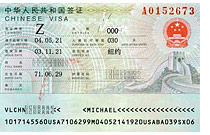 Ah, the pleasures of obtaining a new China visa just a month before the Olympics!
Ah, the pleasures of obtaining a new China visa just a month before the Olympics!
I went into New York yesterday to drop off my application and paperwork for a Z (working) visa and was completely and utterly rejected. Seems that my working permit indicates that I'll be living in China for purposes of employment, while my invitation letter says I'll be participating in a vague-sounding "exchange program".
My employer assures me that this is the same phrasing they've used to obtain Z visas for other foreign experts in the past... but as you all know, what used to be good enough isn't cutting the mustard these days. A new invitation letter is on the way, but since it's issued by the State Administration of Foreign Experts Affairs there's no telling how long it'll take. My flight back to Beijing on July 17 is in serious jeopardy.
Not that I'm the only one complaining, by any means. Having it out with a visa officer in the line next to mine was what I think — using my super-powers of ethnic stereotyping and observation — was an ex-Soviet middle-aged Jewish businessman. He was screaming through the glass partition, "I've been to China ten times! I never had problems getting a visa before! I'm going to be entering through Kazakhstan but leaving by plane! Don't you know that there are valid land crossings into China?!?"
So, I'll just have to sit and wait. The best part was when I complained to the visa officer that getting a new invitation letter from China was "tai mafan" (too much trouble), and she responded, "Not as much trouble as Chinese people have getting a US visa." What, is this some sort of contest?
She reminded me of the commenter who frequently tells me that nothing would make him happier than seeing a purported splittist sympathizer get denied entry into China. I remain optimistic.
posted July 02, 2008 at 08:57 PM unofficial Xinjiang time | Comments (85)
